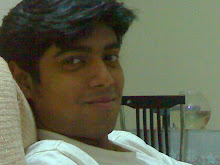A chat with Varavara Rao
I did an interview with Naxal ideologue Varavara Rao sometime back. It was an easy, 20-minute chat, and Rao answered all my queries. An abridged version of the interview was published in the Sunday edition of DNA today.
‘State is the biggest terrorist’
Varavara Rao has been the face of the Naxalite movement in Andhra Pradesh for almost four decades now. A poet, a professor and one of the finest Marxist critics in Telegu literature, he has served several jail terms in his political career beginning with the tribal struggle in the state in Srikakulam following the Naxalbari movement. In this exclusive interview, he spoke on state terrorism and the status of naxalite movement in Andhra Pradesh.
The state is coming down heavily not just on Naxalites but on Naxal sympathisers as well. Is it getting more intolerant than ever before?
It is. The State has become the biggest terrorist. But in Andhra Pradesh, more than in any other state, atrocities have been the worst. If you are a Naxalite, a naxal sympathizer, an ideologue, or simply a civil rights activist, you can be put behind bars or killed in a fake encounter any time. In 1992, for example, journalist Gulam Rasul wrote about a land scam in an Urdu daily. An additional DSP killed him in a fake encounter and branded him a Naxalite. His friend who was traveling with him in a scooter was also killed. Doctors working for the underprivileged, lawyers taking up the causes of the marginalized are being put behind bars. Civil liberties are being curbed like never before. Laxmi, a women's rights activist, was killed in a fake encounter in 2005. Since 1969, more than 2,000 people have been killed in fake encounters.
But didn't the previous Andhra Pradesh government want to negotiate with the Naxalites?
The peace talks between the government and the Naxalites broke down and the ban against them was re-imposed on August 17, 2005. This has led to the cadre to look for alternative operational zones in Orissa and Chhattisgarh. The repression started in the previous Telugu Desam regime and has been continued by the Congress government in pursuance of World Bank conditions. The police launched a crackdown on Maoists on January 6, 2005, when it became clear that there was no meeting ground between the state government and the outfit. Chief Minister YS Rajasekhara Reddy was interested in going ahead with the second round of talks, slated for November 16, 2004, with the CPI (Maoist) and the CPI-ML (Janashakti), but senior police officers advised him against it. He had even acknowledged that the talks were a good sign as they would help a section of the extremists join the mainstream.
Why did the talks fail?
Mainly because the government wanted naxalites to lay down arms while carrying on their political programmes and their propagating ideology. Tthe naxalites rejected this. Following a series of encounters, in which 10 naxalites were killed in a week, the CPI (Maoist) and CPI-ML (Janashakti) announced on January 16, 2005 that they were pulling out of the peace process, which was initiated following a ceasefire that both sides had agreed upon six months earlier.
But what about the movement itself. Is it hard to get the youth interested in Naxalism? Post 1991, it is a different India, far more materialistic.
It is only the petty, bourgeoisie youth who are taking to the market economy. The marginalized youth, i.e. the Muslims, the dalits and the tribals, are swayed by the market forces because they can see that inequality is rising. They are attracted to the movement. Also, there is campus culture today. You can get a degree through distance education without ever walking into a university campus. In a campus, there is scope for healthy political debates. That culture is dying. But my hope is the youth won't be cut off from social realities for long.
Now the Centre has recognised Naxalism not just as a law and order issue, but also as a developmental issue. And it plans to address it as such.
These are academic talks. Manmohan Singh says it is a developmental issue, but he is also supporting SEZs. SEZs will displace people, take away their livelihoos. So the problems will persist. Look at what is happening at Nandigram, at Singur, at all other places. Simply saying developmental issues need to be addressed is not enough. They have to act.
Finally, what is the future of the movement?
The movement will continue. The forces of liberalization and globalization have widened the gab between the haves and the have-nots. This has to be redressed.


1 Comments:
You damn good man!! i think u are better on blog than on newspaper. havent read enough on newspaper neways but u seem to fit in a format when u write for newspaper...
good stuff...
Post a Comment
Subscribe to Post Comments [Atom]
<< Home